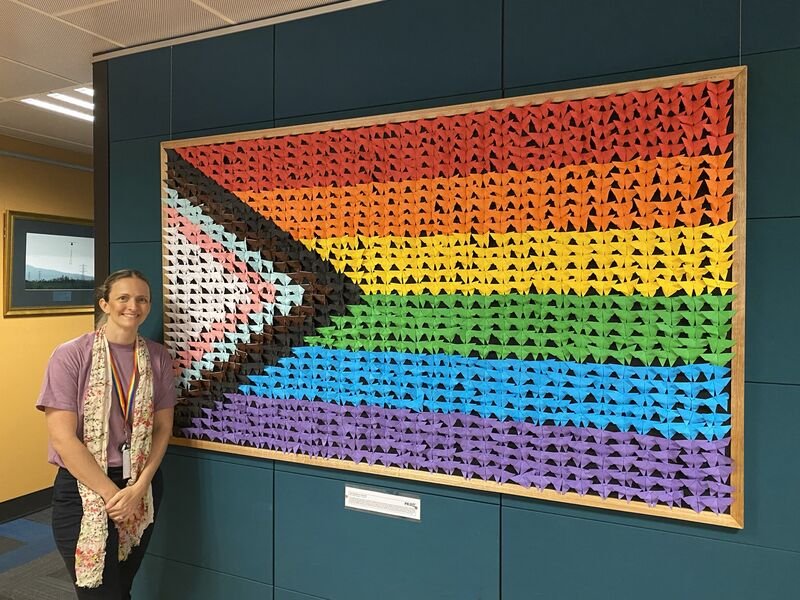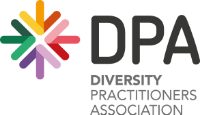Meet our members: introducing DPA's new President, Emma Elder
/Today we launch DPA’s meet our members series by introducing DPA’s new President for 2022, Emma Elder.
Image Description: Emma Elder stands smiling in front of a large flag featuring symbols from the LGBTI+ community, constructed from origami paper butterflies.
What’s your role & organisation?
Business Partner - Organisational Culture and Development at OceanaGold
What sparked your passion for D&I?
From a young age, my parents surrounded me with the most wonderful and diverse extended family (their friends they'd collected through many years of international travel, as well as our biological family). My mum taught me independence and self-confidence, and showed me that developing yourself professionally can happen any time. I have distinct memories sitting in QUT Gardens Point lecture theatres as a primary school student, doing my homework while mum studied Communications as a mature aged student. My dad taught me dedication and a competitive nature of always wanting to do better. He'd pick me up from school on his push bike (I'd sit on the crossbar in my yellow helmet, I'm sure it was very lawful), then teach me how to use power tools to build a tree house, sprint races in our cul-de-sac street where he used to always win (until I was about 12), then he'd cook dinner while waiting for mum to come home from work. We didn't exactly have typical gendered roles in our house.
Having worked in HR for over 13 years, I've always sought a more proactive, systemic approach to solving any HR matter. Where my personal and professional passions collided was actually at the DPA launch event in 2015. I'd started to dip my toe into D&I topics, and was invited by a professional connection to attend the launch event. I signed up as an individual member the next day, and this started my professional D&I journey.
Tell us about the D&I project or work you’ve been most proud of.
Developing and launching Powerlink's first Reconciliation Action Plan was pretty special, gaining a much deeper cultural awareness through Leann Wilson and the DNRME team in an eye-opening two-day workshop called Building on the Strengths of Our Stories, the RAP launch event with Shannon Ruska and crew of wonderful dancers and musicians, and all the relationships and knowledge I gained along the way.
To be honest the moments I'm most proud of actually seem like the smallest things, which get lost amongst the noise of big projects. Progress in D&I starts with small changes to mindsets and opening people's minds to worlds outside of their own. Like helping someone with the knowledge and confidence to do an Acknowledgement of Country for the first time, coaching an employee to present D&I challenges to a group of Executives, seeing a leader confidently ask someone which pronouns they use (and actually use them), and the biggest thing is where a D&I naysayer actively starts to become curious about D&I topics, and starts asking questions to learn more. Coaching people is a big passion of mine, nothing compares to seeing someone proud of their own progress and learning, and knowing you've helped them get there.
What’s one lesson you’ve learned through your inclusion advocacy/work that’s stuck with you?
Just one? I'm going with two...
First: Psychological Safety is foundational for D&I work. If people do not feel that they are in an environment where they are safe to speak up, be themselves or learn from their own mistakes, progress in D&I will be a hard slog.
Second: You don't need to be an expert, a specialist or even "working in HR" to start in D&I, just be curious, open to learning from those with lived experience, and willing to start with the small things. We need way more people doing the small things to make any big differences in organisations and society more broadly.
What D&I topics are you especially keen to chat with other members about?
Where do I start? I'm going with three things this time.
I'm keen to chat about how we can all start to eliminate sexual harassment, harassment and bullying in their organisations and centre respect in the workplace, particularly in male dominated workforces. There's a huge groundswell coming from all angles in society and workplace, and our time is now. If we can all make progress in elevating respect at work, it'll make a big difference to all the other D&I work we're doing.
I'm also interested to chat about organisations who are moving away from the default full-time, 38–40-hour weeks, 9-5. Not just flexible work, but flexible workforce design, workforce development and career pathways. What could the future of work look like, and how can we start to adapt and change mindsets now, so that we're ready for anything the world throws at us (not mentioning a certain pandemic here).
I'd also like to hear from organisations that have an international footprint, and what their approach is to D&I.
What have you found most valuable about being a member of the DPA?
Without a doubt it's the professional connections I've made, and the knowledge and confidence I've gained on a broad range of D&I topics from DPA events and other DPA members. I can't even begin to put a dollar value on how much knowledge I've gained through my DPA connections.














